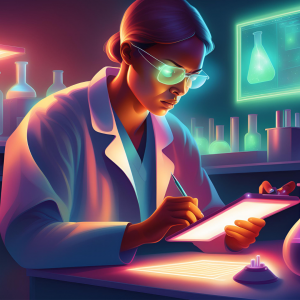As laboratories are tasked with producing accurate and reliable results promptly and efficiently, specialized software has become a necessity. Laboratory software not only streamlines operations but also enhances data management, supports compliance with regulations, and ultimately drives better outcomes. This blog post will explore the key benefits of implementing laboratory software and how it can transform laboratory practices for the better.
Enhancing Data Accuracy and Reliability
 Laboratory software significantly boosts data accuracy and reliability by automating data collection and management processes. Manual data entry often leads to human errors which can jeopardize research outcomes and lead to expensive repercussions. With laboratory software these risks are minimized through built-in validation checks and error alerts ensuring that data remains precise and dependable. Researchers can confidently rely on the integrity of their data knowing it has been verified through automated systems. This heightened precision along with real-time updates and secure storage improves the quality of result and bolsters the laboratory’s standing in the scientific community. At Nexix, we specialize in tailoring checks and alerts to meet the unique needs of your laboratory. Call today to speak with one of our specialists for your specific needs.
Laboratory software significantly boosts data accuracy and reliability by automating data collection and management processes. Manual data entry often leads to human errors which can jeopardize research outcomes and lead to expensive repercussions. With laboratory software these risks are minimized through built-in validation checks and error alerts ensuring that data remains precise and dependable. Researchers can confidently rely on the integrity of their data knowing it has been verified through automated systems. This heightened precision along with real-time updates and secure storage improves the quality of result and bolsters the laboratory’s standing in the scientific community. At Nexix, we specialize in tailoring checks and alerts to meet the unique needs of your laboratory. Call today to speak with one of our specialists for your specific needs.
Efficiency and Productivity in Lab Operations
Laboratory software is essential for smooth running lab operations such as automating routine tasks like sample logging and report generation. This automation eliminates the need for manual data entry allowing lab personnel to dedicate more time to other areas in the lab. The customizable workflows offered by many laboratory software solutions enable labs to tailor operations to specific protocols and requirements ensuring smooth and efficient processes. Furthermore, real-time data updates and automated alerts keep staff informed about the status of experiments minimizing delays and enhancing decision-making capabilities. By optimizing operations and improving task management, laboratory software helps labs run more efficiently and effectively propelling scientific advancements forward. Allow Nexix to assist you in crafting personalized reports essential for making well-informed detailed decisions.
Simplify Regulatory Compliance and Quality Control
Adherence to regulatory standards is crucial for laboratory operations. Laboratory software offers tools for meticulous documentation, comprehensive audit trails, and stringent quality control measures. These features allow laboratories to monitor processes in real time and maintain detailed records. Automated alerts for any deviations from set protocols enable quick corrective actions ensuring that standards are consistently met. Additionally, integrated quality control modules help maintain the integrity of tests and procedures which is essential for achieving reliable and reproducible results. At Nexix, we can build flexible and configurable software to efficiently manage compliance requirements in your area.
Streamlining Sample Tracking and Management

Laboratory software revolutionizes sample tracking and management by offering robust features that ensure efficiency and accuracy throughout the entire sample lifecycle. Researchers can seamlessly log samples into the system upon collection tagging each with unique identifiers that prevent mix-ups and mislabeling. This precise tracking continues as samples move through various stages of processing and analysis with real-time updates keeping researchers informed of their location and status. Integrated barcodes further emphasize the accuracy of sample identification and tracking reducing the risk of human error. Every action taken on a sample is logged and timestamped creating a detailed audit trail. This meticulous documentation aids in regulatory compliance. By leveraging these advanced tracking and management features, laboratories can maintain a high standard of operational excellence, ultimately facilitating more accurate and efficient scientific investigations.
Enhancing Data Security and Confidentiality
In today’s digital age ensuring the security and confidentiality of data is paramount for laboratories. Laboratory software offers robust security measures to protect sensitive information, such as user authentication protocols that restrict access to authorized personnel only. Encryption features secure data both in transit and at rest preventing unauthorized interception and access. Many laboratory software solutions provide secure storage options, allowing for safe backup and remote access while maintaining stringent data protection standards. Laboratories often handle proprietary and sensitive information, making it essential to have systems that safeguard this data against potential breaches. Regular security updates and compliance with industry standards ensure that the software remains resilient against emerging threats. Moreover, laboratory software enables the implementation of detailed access controls ensuring that only those with the necessary permissions can access specific data sets.
Supporting Data Analysis and Reporting Capabilities
Laboratory software empowers researchers with advanced data analysis and reporting capabilities that are crucial for modern scientific investigations. Customizable reporting features allow for the creation of detailed and visually compelling reports. Researchers can tailor these reports to highlight specific metrics, trends, and patterns facilitating a deeper understanding of their data. The integration of interactive dashboards provides real-time access to analytical results, enhancing the ability to monitor experiments and adjust methodologies as needed. This capability not only supports better decision-making but also accelerates the research cycle by enabling quick interpretation of results.
